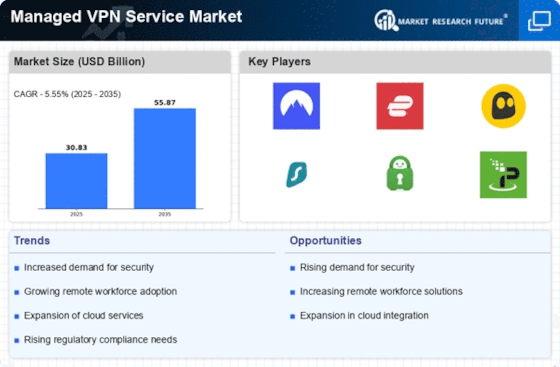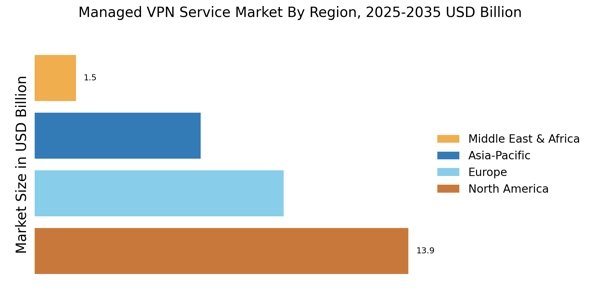Regulatory Compliance Requirements
Regulatory compliance is a critical driver for the Managed VPN Service Market, as organizations face increasing scrutiny regarding data protection and privacy. Various regulations, such as the General Data Protection Regulation (GDPR) and the Health Insurance Portability and Accountability Act (HIPAA), mandate stringent security measures for handling sensitive information. As a result, businesses are compelled to implement managed VPN services to ensure compliance with these regulations. The market for managed VPN services is projected to expand as organizations recognize the importance of adhering to legal requirements while safeguarding customer data. Moreover, failure to comply with these regulations can lead to substantial fines and reputational damage, further incentivizing companies to invest in secure VPN solutions. This trend underscores the vital role of managed VPN services in helping organizations navigate the complex landscape of regulatory compliance.
Rising Cyber Threats and Data Breaches
The Managed VPN Service Market is increasingly driven by the rising incidence of cyber threats and data breaches. As organizations become more reliant on digital infrastructure, the risk of cyberattacks has escalated, prompting businesses to seek robust security solutions. Recent statistics indicate that cybercrime is projected to cost the world over 10 trillion dollars annually by 2025, underscoring the urgency for organizations to protect their networks. Managed VPN services offer a critical layer of security by encrypting data and providing secure access to corporate resources. This heightened awareness of cybersecurity risks is likely to propel the demand for managed VPN solutions, as organizations strive to mitigate potential threats and safeguard sensitive information. Consequently, the Managed VPN Service Market is expected to experience significant growth as businesses prioritize cybersecurity in their operational strategies.
Growth of E-commerce and Online Services
The Managed VPN Service Market is significantly influenced by the rapid growth of e-commerce and online services. As more businesses transition to digital platforms, the need for secure online transactions and data protection becomes increasingly critical. The e-commerce sector is expected to reach a valuation of over 6 trillion dollars by 2024, highlighting the immense potential for managed VPN services to facilitate secure connections for online transactions. Additionally, the proliferation of online services, including cloud computing and streaming, necessitates robust security measures to protect user data. Consequently, organizations are increasingly adopting managed VPN solutions to ensure secure access to their services, thereby driving growth in the Managed VPN Service Market. This trend suggests that as e-commerce continues to flourish, the demand for secure VPN services will likely follow suit.
Increasing Demand for Secure Remote Access
The Managed VPN Service Market is experiencing a notable surge in demand for secure remote access solutions. As organizations increasingly adopt remote work policies, the necessity for secure connections to corporate networks has become paramount. According to recent data, the remote work segment is projected to grow at a compound annual growth rate of approximately 15% over the next five years. This trend indicates that businesses are prioritizing the protection of sensitive data, which is driving the adoption of managed VPN services. Furthermore, the rise in cyber threats has heightened the focus on security, compelling organizations to invest in robust VPN solutions that ensure data integrity and confidentiality. Consequently, the Managed VPN Service Market is likely to witness sustained growth as companies seek to enhance their cybersecurity posture while accommodating flexible work arrangements.
Technological Advancements in VPN Solutions
Technological advancements are playing a pivotal role in shaping the Managed VPN Service Market. Innovations such as improved encryption protocols, enhanced user interfaces, and the integration of artificial intelligence are transforming the capabilities of VPN services. These advancements not only enhance security but also improve the overall user experience, making managed VPN solutions more appealing to businesses. The introduction of next-generation VPN technologies, such as software-defined networking (SDN) and cloud-based VPNs, is expected to drive market growth as organizations seek more efficient and scalable solutions. Furthermore, as technology continues to evolve, the Managed VPN Service Market is likely to witness the emergence of new features that cater to the changing needs of users, thereby fostering further adoption of managed VPN services.

















